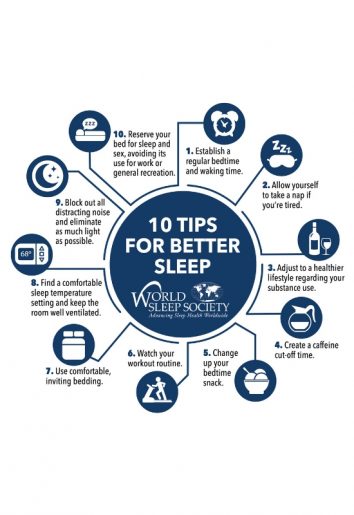March 13th is World Sleep Day: What's the Significance?
March 13th is World Sleep Day. On this day, the World Sleep Society is issuing a worldwide call to action regarding the importance of getting quality sleep each night. Read below to learn how you can achieve a more restful night.
How Does Getting Sufficient Sleep Improve Your Quality of Life?
It's common to hear that getting a full seven to eight hours of sleep per night is good for us, but many people don't know what good all of that rest actually does. The fact is, while we're resting, our bodies are hard at work performing a broad range of functions. Here's just a short list of things that happen as a result of getting enough quality sleep each night.
Improved Heart Health
 Research has found that people are more likely to suffer heart attacks and strokes in the early hours of the day, and that those who don't get enough sleep are more likely to develop hypertension and high cholesterol.
Research has found that people are more likely to suffer heart attacks and strokes in the early hours of the day, and that those who don't get enough sleep are more likely to develop hypertension and high cholesterol.
Optimal Cellular Health
The growth of tumors and cancer is more common in those who work graveyard shifts and sleep during the day. Scientists believe this has something to do with disruption of the circadian rhythm, which regulates sleepiness and wakefulness. By trying to sleep during daylight hours, or with a light turned on, your biological clock is disrupted and that may also affect the body's immune system.
Reduced Stress
Failing to get enough sleep starts a cycle that can be very difficult to break. When you don't get enough sleep, your body produces higher levels of stress hormones. Among the adverse effects these hormones have on the body is interfering with the sleep cycle. Higher levels of stress hormones make it more difficult to sleep soundly, which causes more stress hormones to be produced.
Reduce Inflammation
The stress hormones produced through the lack of quality sleep also cause inflammation throughout the body. While the immune system uses inflammation to help treat injuries and infections, prolonged, or chronic, inflammation is harmful. It increases the risks of heart disease, cancer and diabetes. Some scientists believe it also plays a part in causing the physical deterioration we experience as we age.
Improved Cognitive Health
Quality sleep also helps the brain rest and rejuvenate itself. This is why we wake up feeling more refreshed after a good night's sleep. Specifically, a full night of rest improves memory recall, concentration and mental clarity. This occurs because the resting state provides time for the brain to link memories with sensory input and emotions, making it easier for you to learn new things.
Helping the Body to Help Itself
As you sleep, the body repairs the damage done throughout the day by harmful environmental factors and toxins you have ingested. Even healthy activities, such as physical exercise, cause damage and stress to the body's muscles and tissue.
During sleep, the muscles, tissue, and organs are repaired and strengthened. This is also the time at which two hormones beneficial to weight loss, ghrelin and leptin, are released into the blood. In depriving yourself of enough sleep, these processes are halted, which is why it's common for overweight and obese people to also suffer from sleep disorders.
World Sleep Day: Tips For Getting Better Quality Sleep
 World Sleep Society established World Sleep Day® 13 years ago, because they wanted to remind us all of the importance of sleep. In addition to recognizing the value that a good night's sleep provides, this annual event is also an occasion to share helpful tips for getting good quality sleep.
World Sleep Society established World Sleep Day® 13 years ago, because they wanted to remind us all of the importance of sleep. In addition to recognizing the value that a good night's sleep provides, this annual event is also an occasion to share helpful tips for getting good quality sleep.
While getting enough rest doesn't seem like it should be difficult, a large number of people do struggle with getting a full night's sleep. These tips can help you get to sleep faster and stay asleep throughout the night.
Ditch the Stimulants
Caffeine is among the top culprits in keeping you from enjoying a deep sleep. Experts recommend stopping your caffeine intake at least six hours before bed, so your body will have time to process the last remnants of the stimulant. Additionally, turn off mobile devices at least one hour before bed. The blue light that these devices emit disrupts the circadian rhythm, which will offset your sleep cycle.
Increase Exposure to Daylight
You can also use the circadian rhythm to your benefit by getting more bright light exposure throughout the day. If you fill your waking hours with bright light, especially natural sunlight, the evening darkness will have a more profound effect on your brain. In one sleep study, participants fell asleep 83 percent faster when they were exposed to an increased level of brightness throughout the day.
Engage in Relaxing Exercises
You can also improve your sleep quality by developing a bedtime ritual that emphasizes relaxation. This can involve reading a book, taking a warm bath or meditating by candlelight. Some people find it helpful to listen to soft music just before bed, as well. You can choose any technique that helps you feel more relaxed, as long as it works for you.
Evaluate Your Sleeping Quarters
Sometimes, the problem with getting quality sleep is in the environment, so take the time to examine your sleeping quarters. Determine if your mattress is firm enough to support you comfortably. You may also need to replace your bedding by choosing sheets and blankets that are softer and more comforting. Heavier curtains and blinds can help eliminate any excess light that gets into your bedroom at night. If ambient noises keep you awake at night, try wearing earplugs or noise-canceling earmuffs.
If you try all of these suggestions and your quality of sleep doesn't improve, you may need to consult your doctor. A physician can help you determine the cause of your sleep disorder and may prescribe supplements to help you sleep better. Since getting sufficient sleep affects every aspect of your life, suffering with a sleep disorder is not something you should do for long.




